Jumping straight into the action at 15L Zoom, we three-bet with pocket sevens and make a small continuation bet.
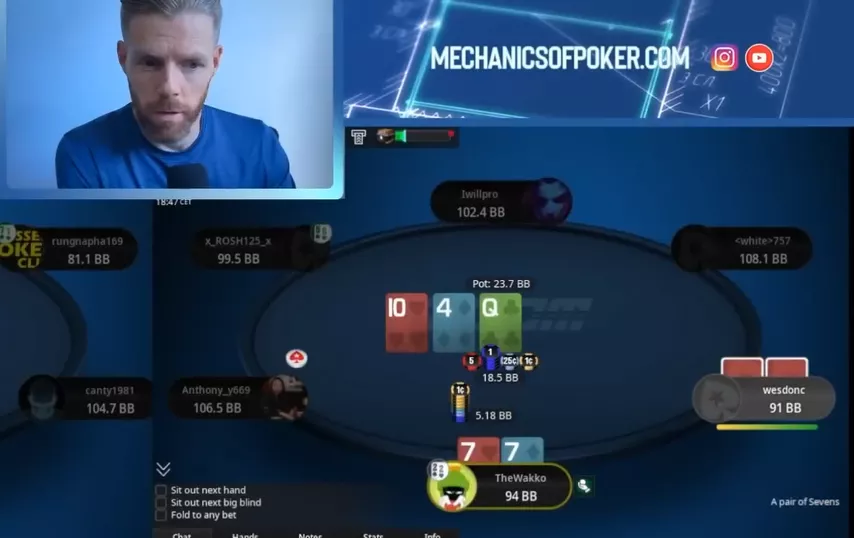
The hijack calls.
Turn (28.4bb):
I think on the turn, it's a bit close as to whether we want to bet our hand again. If we had a club, we would probably want to, but it's very close. I'm going to go for a barrel here; I don’t mind it.
Bet 19.9bb, opponent calls and checks the river.
River (66.1bb, effective stack 66bb):
On a jack, we’re definitely going to rip it in. This is one of the reasons why you want to add a couple of these lower pairs to your barreling range. For example, when the jack, which is a very good card for me, completes, I’ll have very few bluffs in my perceived range because many players tend to miss these types of barrels.
All-in and the opponent folds.
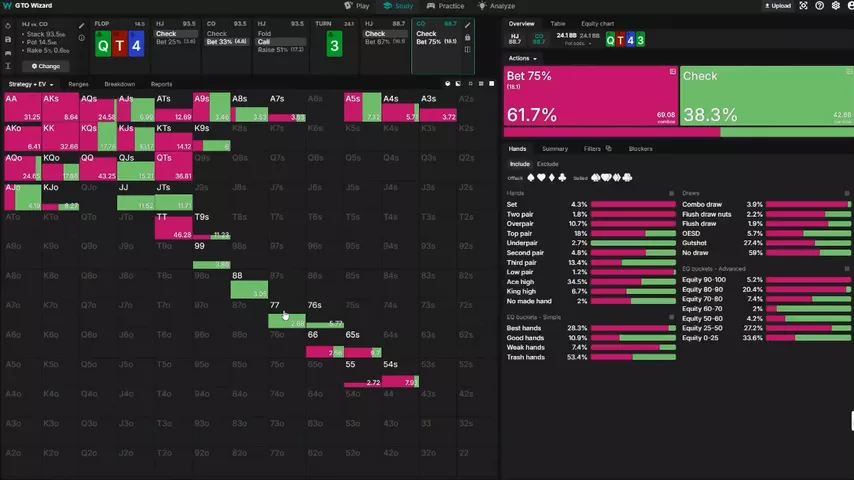
Yeah, I thought so – sevens, eights, nines go to check on the turn, and you can bluff with sixes and fives. And it's probably not bad to have one club as well. But don't expect too much from your hand! With sixes, you need to barrel with or without a club. And on the river, of course, a mandatory double bluff.
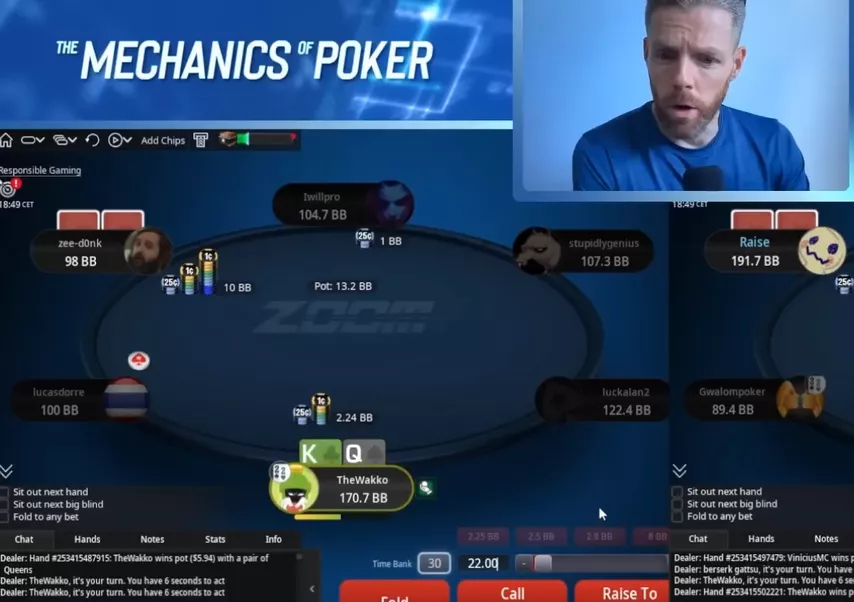
With King-Queen offsuit here, we could actually consider a four-bet. Now, I don't really know the dynamics in a 50NL Zoom game. If people under three-bet or over-four-bet, I would imagine that players have found the three-bet charts but are probably leaning towards overfolding to four-bets.
Raises to 23bb. Opponent folds.
However, I could definitely be wrong; this is just intuition. If I think about it, okay, it’s easy to find three-bets, but it usually becomes harder to fight back in this spot. I think I’m just going to try to play solid since I have no read on my opponent.
This is where GTO strategies come into play. If you are not sure if your opponent is under three-betting, over three-betting, under-folding to four-bets, or overfolding to four-bets, you should play a defensive strategy. For instance, you can grab King-Queen offsuit and decide to four-bet about 25% of the time or so. You might roll out a four-bet, but this shouldn't be the extent of your strategic approach. You should always try to look for more information on your opponent or the player population to determine if you should either always four-bet King-Queen offsuit or never four-bet it.
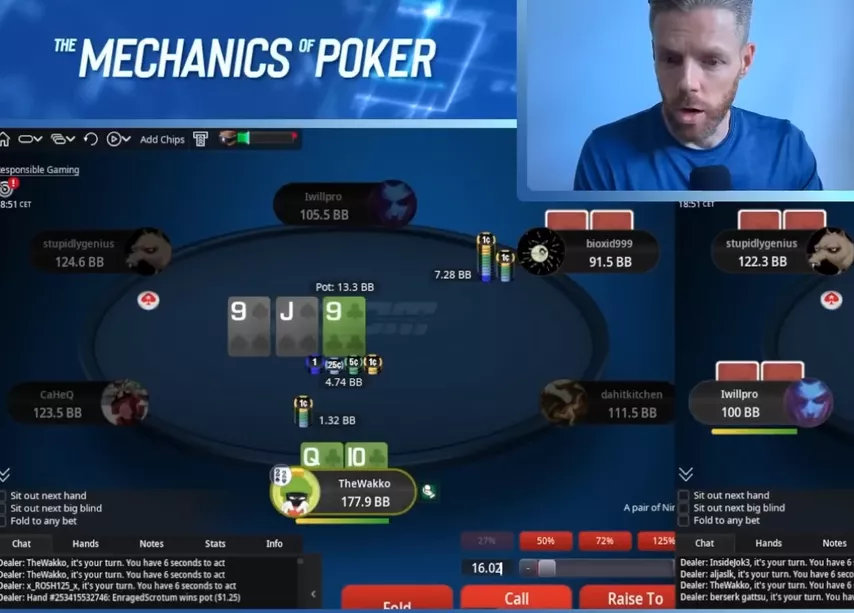
Facing a big check-raise here with Queen-Ten is an easy call, of course, and I hope to improve on the turn with either a club, a queen, or an eight.
Calls.
Turn (18.6 bb):
The opponent bets 6.12 bb.
That’s fine for sizing. I would imagine that this represents something about our hand—that it may be strong enough to just raise and stack it off if I think I have a weaker draw. I don’t mind raising and then folding to an all-in because I think my draw is strong enough to warrant a call. However, this sizing seems to indicate a weaker hand, so I use it here.
Raises to 27.7bb. Opponent folds.
With pocket Aces, I check back and face a bet. I’m just going to call and let him hang himself. I’m definitely raising on the river here. I wanted to focus a bit on the differences between 50NL and higher stakes. One thing is for sure: I think players at lower stakes tend to give away much more information through their timing and sizing. In general, they are going to be less deceptive.
If a player checks, it tends to indicate weakness, while a bet is typically strong. For example, a small bet is likely weighted toward a weaker hand—that's just my general idea. There are various adjustments we can make in strategy to take advantage of this tendency, and hopefully, some spots will come up. I believe players will give away information and be less deceptive. They will likely overfold in certain lines and underfold in others. Specifically, I think they tend to overestimate their hand strength and are less capable of making big folds.
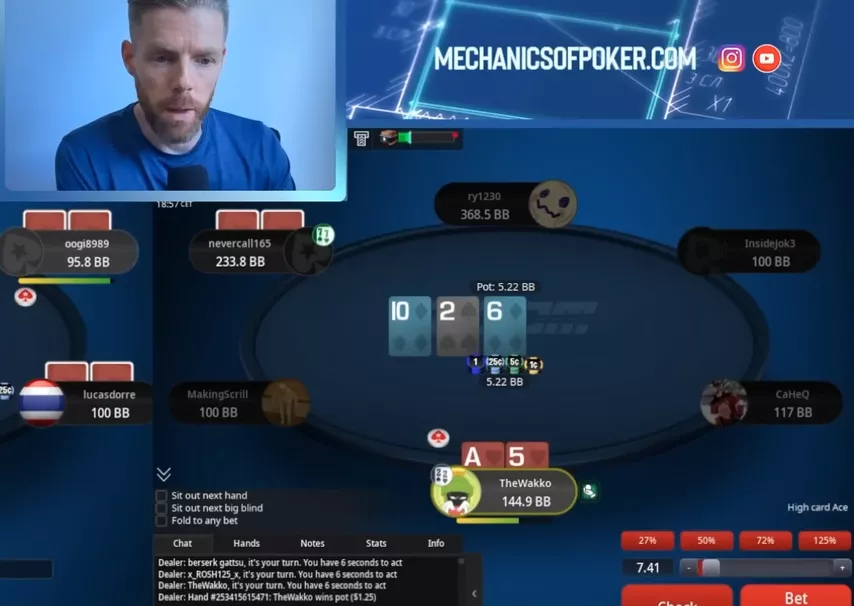
With A-5, I think we get overboard, so I’ll check. I’m going to go for an overbet here; it's a bit loose, but in general, it's a very good board for me.
Bet 7bb. Opponent calls and checks the turn.
Turn (19.3bb):
I definitely will continue barreling here. I think that’s probably fine, as there are going to be a lot of good cards for my range. If my opponent has a six, seven, eight, or nine with a diamond, he’s in a very tough spot either now or in the future. If a king or a jack rolls off, he’ll be pretty uncomfortable.
Bet 14.5 bb. Opponent folds.
I think this could be a bit out of line but is still fine here. We isolated what I believe is a recreational player who check-called the flop and check-called the turn. I’m going to check the turn and see how fast and large he bets on the river. If he snaps checks, that makes me feel like he is very over-representing high cards. We can either bet small or overbet here. I’ll go for the overbet, as this aligns with the earlier point about players giving away information.
The snap check there indicates to me that if he has some sort of hand, he probably wants to think about it. I suspect that his range is very overcard-heavy. With this information, we can adjust our strategy. I decided to go for an overbet that would be very bluff-heavy, while if I had a value hand, I would probably size down because of the way his range looks now.
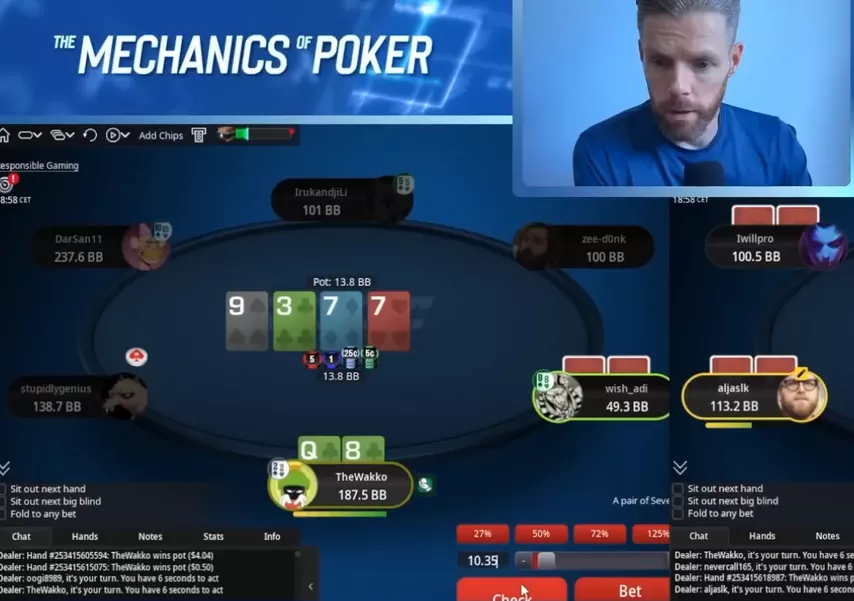
We isolated what I believe is a recreational player who check-called the flop and check-called the turn. I’m going to check the turn and see how fast and large he bets on the river.
Checks in after.
River (13.8 bb):
The opponent immediately checks.
If he snaps checks, that makes me feel like he is very over-representing high cards. We can either bet small or overbet here. I’ll go for the overbet, as this aligns with the earlier point about players giving away information.
The snap check there indicates to me that if he has some sort of hand, he probably wants to think about it. I suspect that his range is very overcard-heavy. With this information, we can adjust our strategy. I decided to go for an overbet that would be very bluff-heavy, while if I had a value hand, I would probably size down because of the way his range looks now.
Bet 17.2bb. Opponent quickly folds.
This is definitely a tip for me: when you play lower stakes, pay a lot of attention and be primarily focused on what your opponent has, given the information they provide. Within the player pool, there are certainly better and worse players. For the better players, you can try to stick to a solid game plan, but for the majority, you want to play as exploitatively as possible. Really think about what their actions mean and what this says about their range, and therefore, what the consequences are for your strategy.
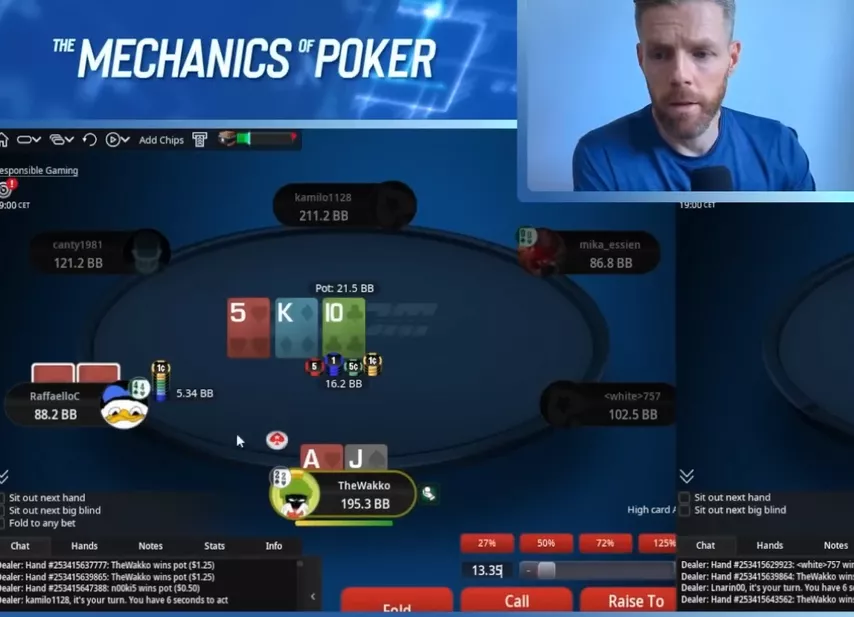
Going for a three-bet with Ace-Jack against what I think is a recreational player, I get a call from the small blind, who then leads out. In this case, I would probably not continuation bet because I feel like a cold call indicates either broadway hands or lower pairs. On the turn, he is basically going to tell me what he has. With a small lead, I’m not really sure, but we’re getting priced in, so I’m going to call.
Makes a call.
Turn (26.3bb):
The opponent bets 17.4 bb.
For that reason, if you think about how his range looks on the turn, I’m actually going to fold. The small blind leads out after cold-calling the flop. Given the texture of the board—three high Broadway cards—I think folding here is appropriate. We could consider turning our hand into a bluff, but again, we discussed earlier the tendency to under-fold, particularly with absolute strong hands in big pots. A hand like King-Queen is something I expect not to happen often enough here. The fact that he has a leading range suggests that his checking range is likely even weaker. That doesn’t mean his leading range is weak, especially not on a King-10-x type of board.
Therefore, I think I’ll just fold straight away.
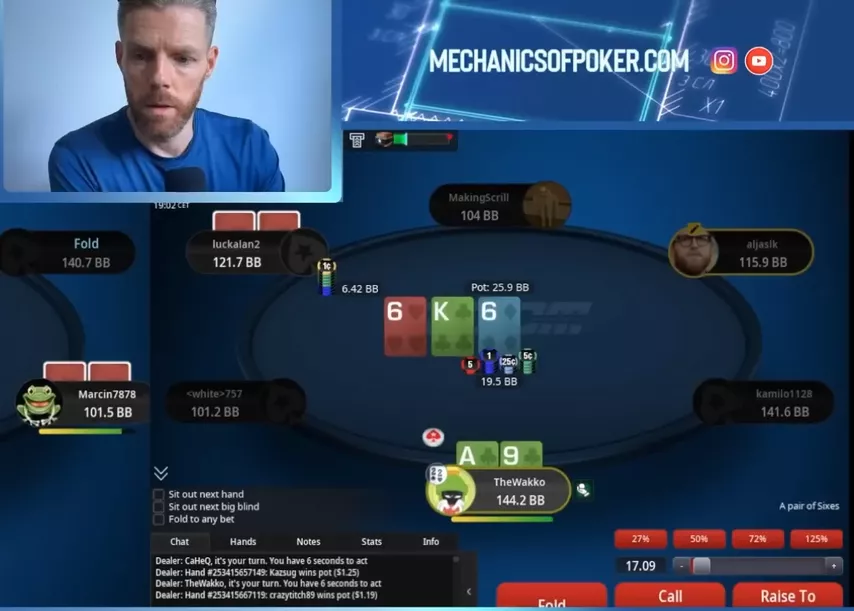
I will definitely call a three-bet with 8-9, and I’m going to call the flop, reevaluating on the turn.
Turn (31.7bb):
The opponent checks.
I feel confident betting higher with my strong hands and definitely not betting lower. I’ll be betting with lower pairs like deuces and threes, but I’m not 100% certain about my approach here.
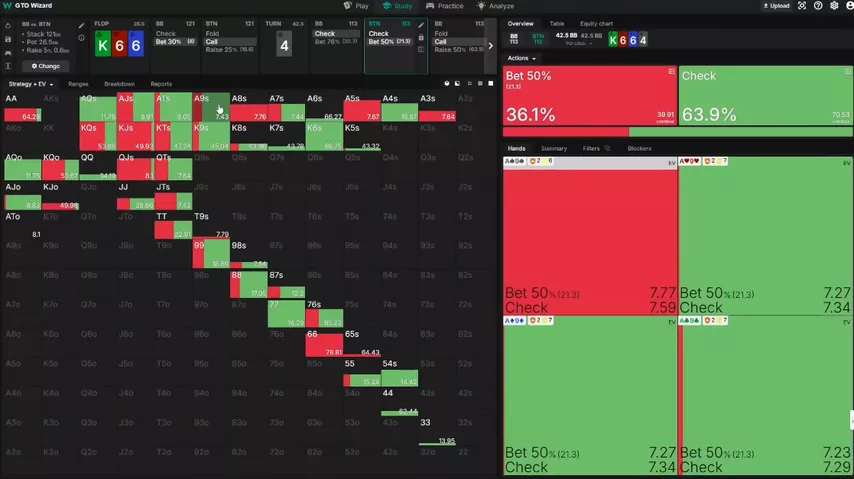
Bet 22.2bb. Opponent calls and checks the river.
River (73.8bb, effective stack 99.5bb):
In this situation, a check-call feels very nines, tens, jacks, and queens oriented. The runout is actually pretty good for me, as I might improve to a hand like pocket fives or 7-8 suited if I had floated that. If we talk about players over-folding, I think in this spot that's likely because their turn check-calling range is transparent. It looks like they could have nines, tens, jacks, queens, or possibly King-Jack or King-Ten that they decided to three-bet.
It's all-in. The opponent quickly folds.
In a GTO solution, they probably have to hero-call with jacks that block King-Jack suited or some queens. On average, I’ve noticed in lower stakes that players tend to be more risk-averse and fold more. We also block the strongest hands they could have, like Ace-4 suited or A-7 suited.
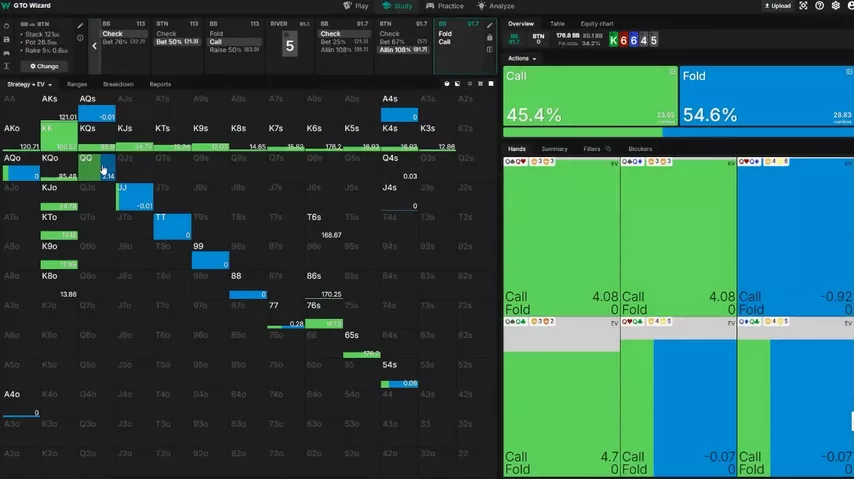
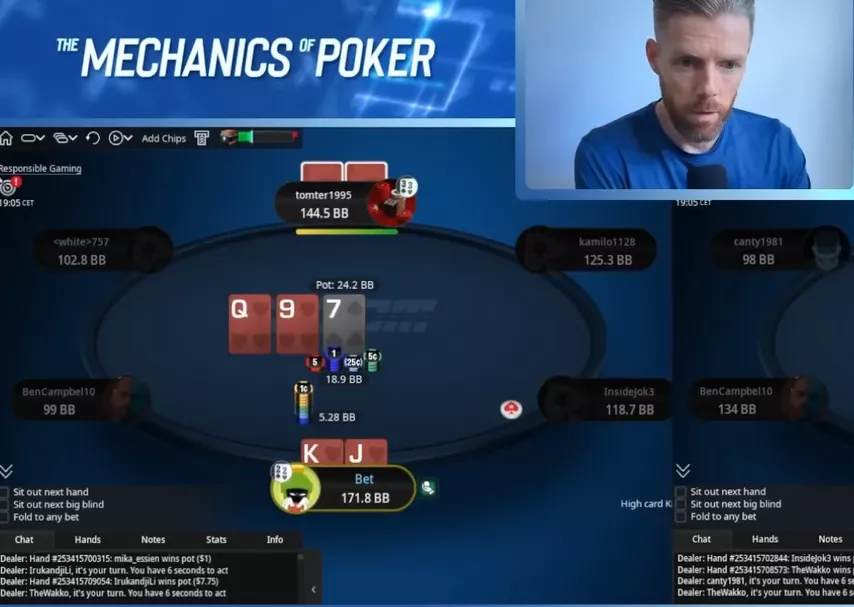
With King-Jack, we flop pretty well, and we’re deeper stacked. If we weren't deeper, I might have considered a big bet-check line, but right now, a call is easy.
The opponent calls.
Turn (28.9bb):
The nine is a very bad card as it improves his potential bluffs, as well as hands like 9-7, 10-7, and 9-10. However, we turn the Royal Flush.
Bet 8bb. Opponent calls.
River (44.3bb, effective stack 131.1bb):
This could be a spot where people might tend to over-call on the turn. I wouldn’t have minded sizing up as well, but I decided to just follow GTO principles. Now we have to think about the best line of action. I would say a check-raise is probably the best option here. We might lose some value from hero calls, but I don’t think he’s ever going to raise with a queen; he’s more likely to bet a queen.
We could also induce a bluff from something like Ace-Jack with the Ace of Hearts. While we might lose some value from Jacks, we do block them. If he has a lower flush—say 5-4—and we just bet, he might snap call, but we want to extract as much money as possible. I think it’s important here to go for the check-raise, aiming to stack Queen-x or better. There are plenty of hands in his range that he will call but not raise.
If we check, he could now bet those hands, and then call a check-raise. If he has a cooler, like a boat, it’s unfortunate, but that’s part of the game. Ultimately, I hope he would show up with something like a lower flush.
Waiting.
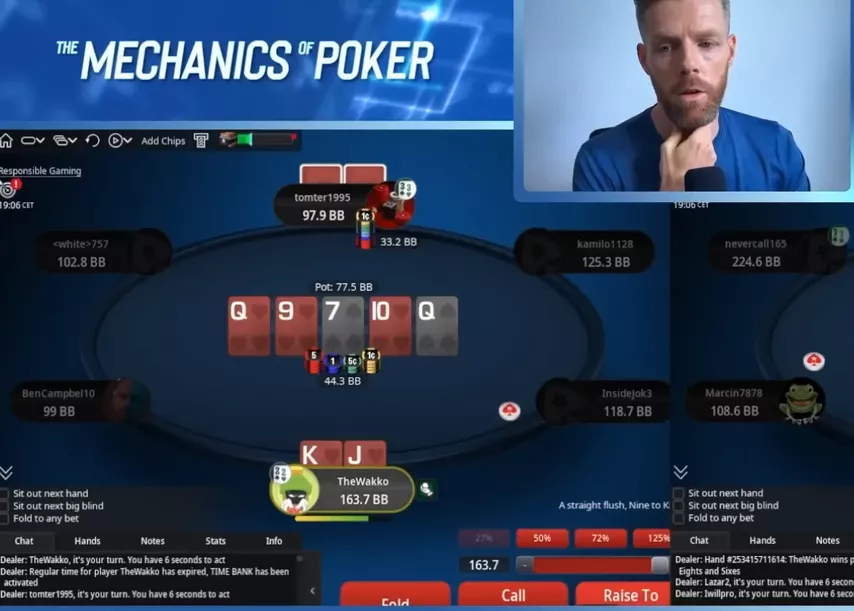
Rene goes all-in and gets an instant call from .
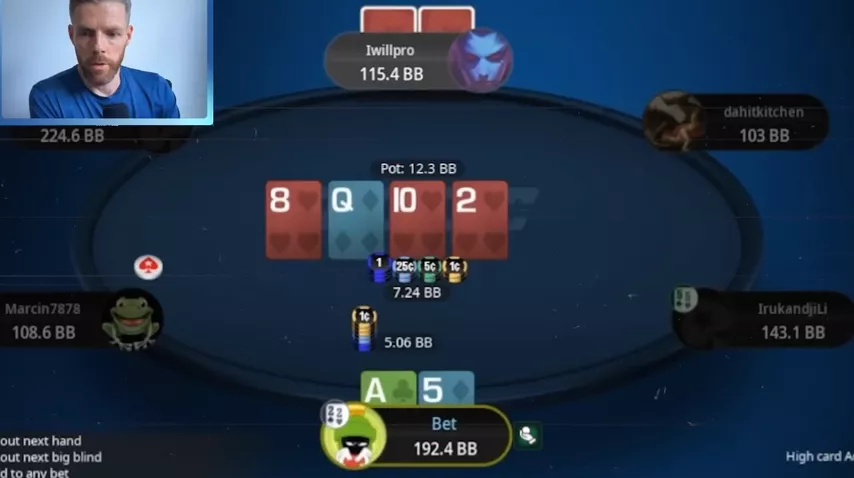
Here, I have A5 and I’m ready to barrel again.
On the turn, I think it’s good to include some unnatural bluffs on these three-flush boards. If a four-flush comes in, having a bluff becomes effective—not necessarily for theoretical reasons, but because it allows you to apply pressure when the four-flush completes. Think about it from the opponent's perspective: when was the last time you called a turn c-bet only to see a four-flush hit on the river and thought your opponent didn’t have a flush? Usually, if they bet the turn and the four-flush comes in, they are likely to have that flush. Therefore, from an exploitative perspective, adding some of these turn bluffs makes sense.
The opponent folds.
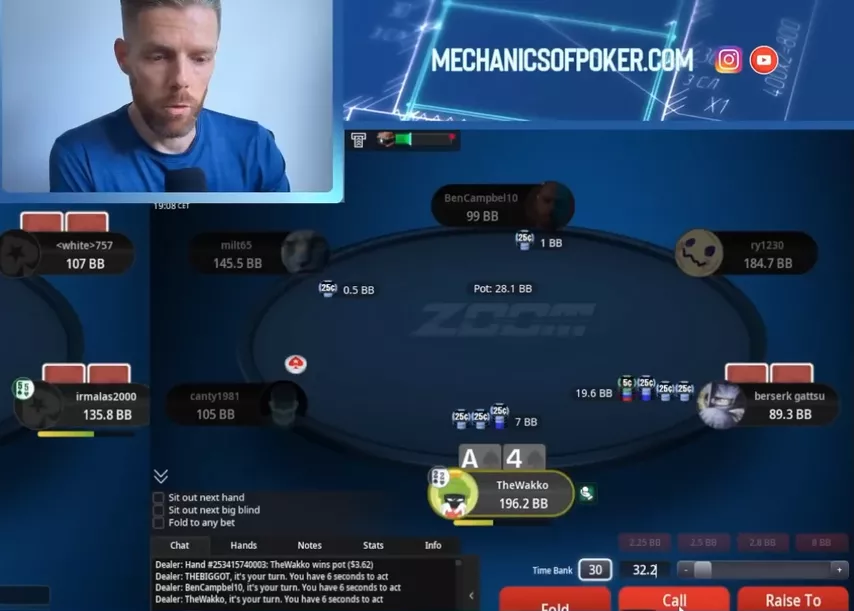
In this situation, I'm looking at A-4. It’s a close call, but in this type of situation, I’m not 100% sure what the optimal play is. I suspect that A-5 might be a better hand for this scenario, while A-4 could sometimes go for a 10% play. This player seems studied; they’ve likely been watching strategies on YouTube, so I’ll definitely call for now.
Flop (38.7bb):
The opponent bets 3.86 bb.
I call, of course.
Turn (46bb):
Now, I think we're at the point where players often make a mistake by strengthening their betting range while weakening their checking range. I’m inclined to go for a block bet here, which I think is good. I’m not overly thrilled about it, but with position, this price probably can't be faulted. We’ll need to reevaluate on the river.
The opponent bets 15.2 bb.
Blockbet again. Right. What should I do? Well, it's disgusting, but in position and with such pot odds, I probably can't fold yet.
River (74.8bb, effective stack 70.2bb):
The opponent checks.
The bluffs here should come from something like King-Queen suited. I'm fairly confident they're all bluffs, but I wouldn’t have called a bet. I just don’t think this is a spot that gets bluffed often, especially at lower stakes. On the river, I’m going to check behind; there’s basically no value in betting.
Checks and wins against .
He played his hand exceptionally well, in my opinion.
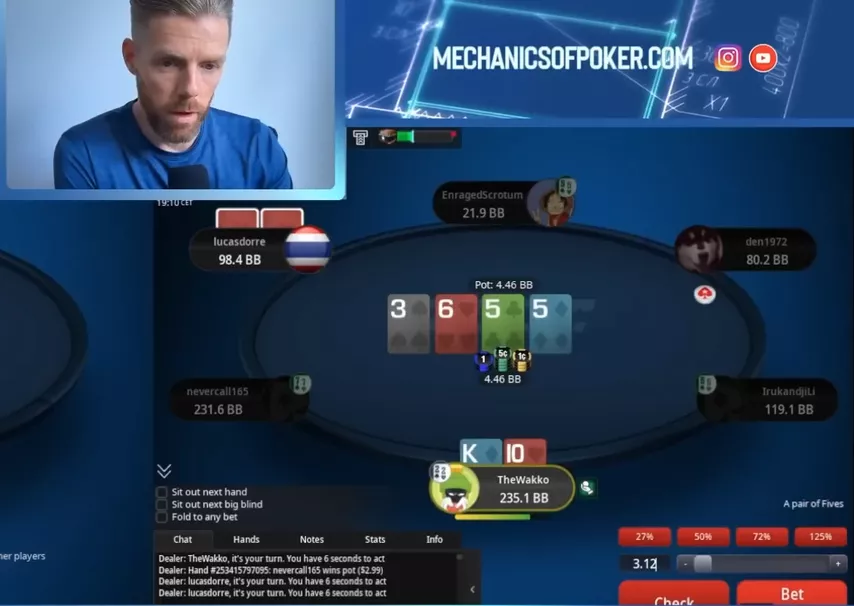
With a hand like King-10, I actually don’t mind seeing Queen-10 suited being a bluff. The bluffs are relatively easy to find, particularly with hands like Queen-10 suited, King-10 suited, and King-Queen suited that do not have clubs. The only issue is that on high boards, when everything bricks, players tend not to be very happy bluffing because they often hold an Ace. As I mentioned, these tendencies seem to magnify at lower stakes.
I could donk here, but this hand is probably not a donk in theory. When I say "could donk," I’m referring to this board, but I don’t typically do that. I think when he checks back, I will do something exploitative and just bet. Betting half pot seems reasonable as an overall strategy. I believe, on average, we should be getting more folds than what would be considered theoretically optimal here.
Bet 2.22bb. Opponent calls.
River (8.68 bb):
Now we actually hit something, so I’m going to bet. I definitely want to include another block bet in my strategy, but I don’t think King-10 is a hand that should be blocking. My block bets should be reserved for hands that cannot value-bet for this sizing and for hands that want to check-raise.
Bet 6.08bb. Opponent calls and loses.
In a situation like this, my initial approach would not be to play GTO but rather to operate under the assumption that, on average, checks will be weaker and bets stronger. I’ll then readjust from there.
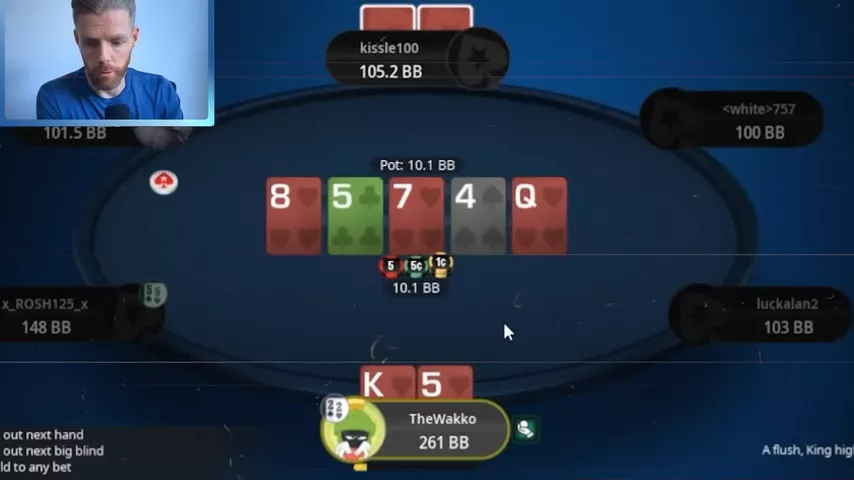
He bets 17 bb, the opponent folds.
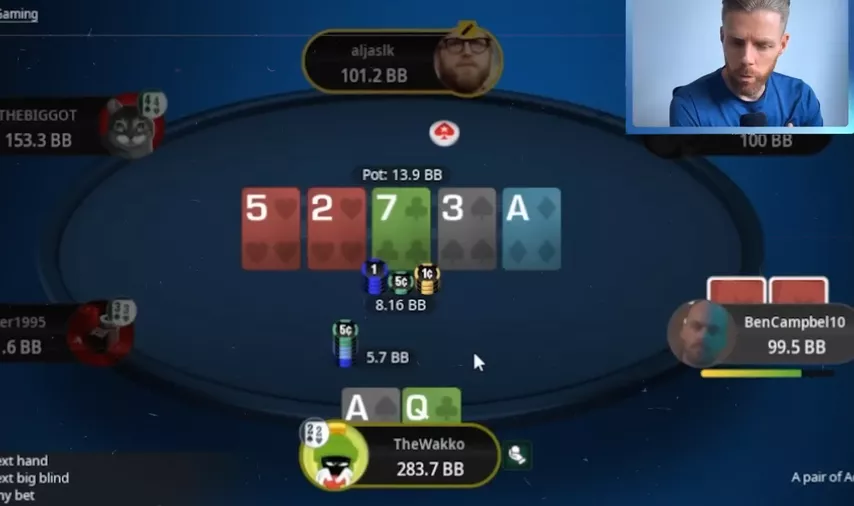
With Queen-X, it’s an easy call; I could also consider a raise sometimes. If he checks, I’ll bet small, let’s see if I’m making a mistake here. With my strategy, I’ve decided to call the check-raise because I think this spot is where players often have a lot of 7-X or pocket eights or sixes. They might think, “Oh, well, you don’t have a four; you probably just have an Ace.”
He can have many strong hands, at least theoretically or perceived, but I just don’t see many players check back enough strong hands on the river because they’re often too afraid. I’ll check back with an Ace or maybe a seven or something like that. So, if players on average overestimate how many strong hands they have and then check, they might see a bet and think, “I probably just have an Ace,” when they could actually have a lot of four-X hands.
But in the meantime, they might be holding sixes, fives, or just a weak one-pair hand in general, which could lead to over-bluffing.
The opponent folds.
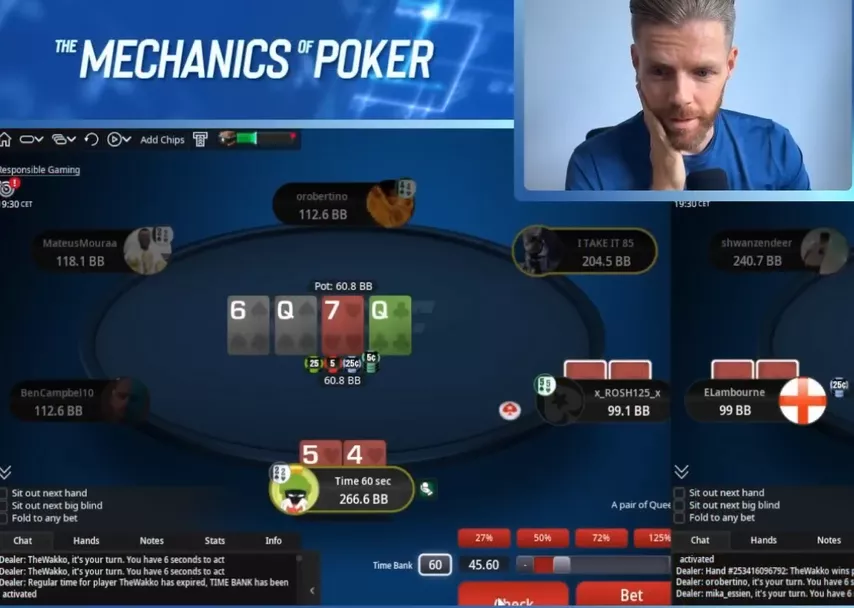
'm going to go for an overbet here with Queen-Jack, sizing up a little bit because we're a bit deeper. I’m not sure if actually setting up stacks is a good idea, so perhaps my regular sizing would have sufficed. But hey, Queen-Jack is my favorite hand, so obviously I'm not folding—remember, you need a favorite hand!
The opponent bets 28 bb on check.
If I pursue it, come on, let's make the four-bet! I'll call this one. I'm going to go for an overbet here with 5-4, and I probably should check my range here on a queen. If I consider the hands I want to be overbetting, it’s mainly driven by Kings and 6-7. Given that he called, his range is likely very Queen-X heavy, so I think checking is fine. I do like the overbet; I think it's a good play with my specific holding. But yeah, sometimes you just have to turn your hand and definitely check-raise here.
This is a board that will probably see a lot of overbetting, and I have a decent hand to do it with.
To go back to the Queen-Jack, I feel that up until 200 big blinds deep, it’s good to start sizing up. But at some point, when you get very deep, trying to get your entire stack in can lead to getting called by sets. I think I went a bit too big for the stack size we had.
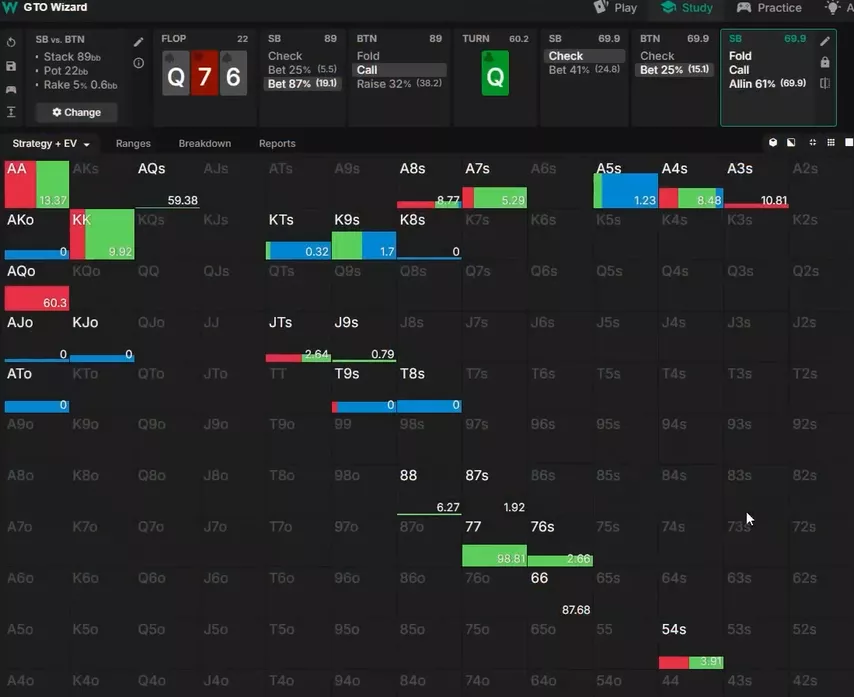
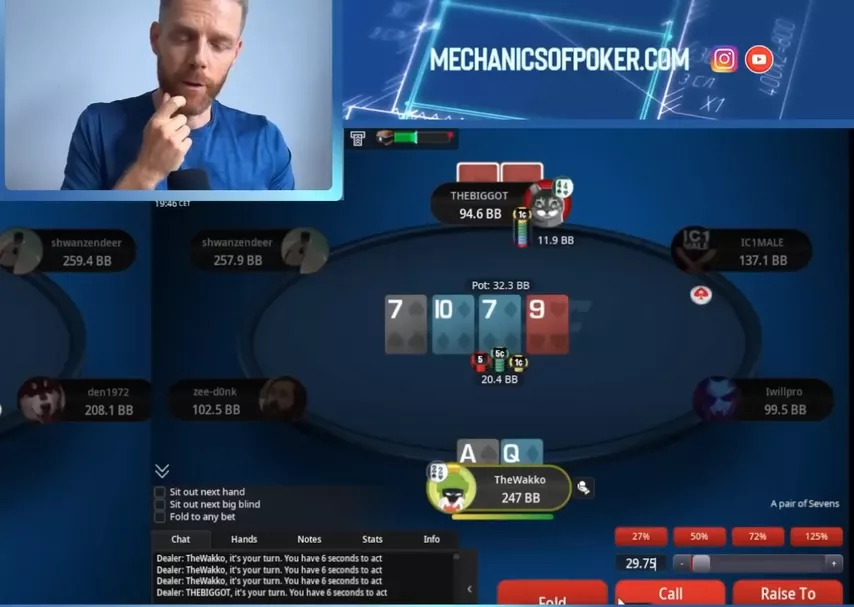
I 3-bet preflop. The flop was check-check. He bets the turn. I know for sure that I have a call, what about ?
He thinks for a long time and calls (according to the solver, this is a fold).
River (43.1 bb):
When I call, I'm more hesitant. If we check the flop and check the turn, Ace-King is definitely a call, and Ace-Queen should lead the river in this situation. There’s some funky stuff going on here, and I’m likely going to fold to a raise. I’m not entirely sure about my sizing; I could have potentially sized up a bit larger. The reason I lead the river is that I don’t want him to just check back with hands like a nine, ten, pocket eights, or pocket sixes. By betting small, I kind of force him to call me with those hands.
Bet 12.5 bb. Opponent folds.
King-Jack did get there, but he also has King-Queen and Queen-Jack in his range. I believe my hand is worth a little more than the size of the bet I made; half-pot would have been fine as well. I was also somewhat concerned that he might check back with Queen-Jack or King-Queen. Essentially, I'm leading the river because I’m worried he’ll miss out on value from hands that could potentially call a bet.
This situation is pretty interesting on the turn. If he checks, I think about it for quite a while. I would be inclined to make some significant folds here on the turn. If he checks, I would apply a lot of pressure again under the assumption that players generally show a bit of deception, betting too much with their strong hands and checking too often with their weak hands.
The way we can adjust to that is by value betting thinner, using bigger bet sizes, and adding more bluffs to our betting range.




















